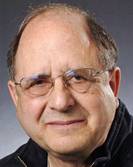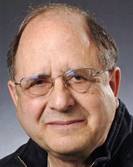Stephen Frank
Family: Married to Barbara for 47 years. She retired as coordinator of housing at St. John’s University. One son, Thomas, graduated from St. John’s Prep School and SJU. Resided in St. Joseph since 1989.
Biographical background:
Occupation: Teacher for about 50 years. Now in phased retirement. Political-science professor at St. Cloud State University since 1978. Was an occasional guest lecturer in University of Minnesota, Duluth, masters of Advocacy and Leadership Program. Founder and co-director of the SCSU Survey.
In the early 1960s, I was a Ford Foundation high-school teacher at three Michigan high schools and received tenure at Clarkson (Mich.) High School. Received a master’s degree and taught at a Michigan community college for two years and then began a doctorate program.
Education: Doctorate in political science from Washington State University. Heavy emphasis on state and local government. Post-doctorate work at the University of Michigan’s Survey Research Center. Post-doctorate National Endowment for the Humanities award to study the Framers and the Constitution at the University of Texas (summer 1977).
Some professional activities: Past president of the Minnesota Political Science Association. Frequent consultant to state and local governments; participated on local boards, commissions; and am frequently asked to share my views with government agencies, nonprofits and the media. Past elected president of the SCSU faculty. Department chair (twice). Author or co-author of articles and book publications. Minnesota Political Science First Distinguished Professor of Political Science. Served on and worked with many local, regional and state agencies. Was an original member of the St. Cloud Zoning Board of Appeals and served on its Charter Commission.
On a leave, I worked with the State Planning Office and Minnesota Lottery and did extensive work with county and local governments. Through work on the SCSU Survey, I have come to know the views of Minnesotans on a variety of issues. Featured speaker at League of Minnesota convention and board meetings.
Early and strong supporter of the St. Cloud Human Rights Commission and am a board member. Serve on St. Joseph’s Economic Development Board. Recently served with one other council person negotiating contracts with our two unions. We negotiated an equitable contract for our employees while keeping the total wage package under our goal of 3 percent. Negotiated some important contract changes. We avoided arbitration or a strike. I have served or still serve on other city positions. I am a strong advocacy of openness and transparency. Favor St Joseph becoming a Green-Step City.
Why are you qualified to serve on the city council?
I work hard at studying the issues and am not afraid to ask questions. With my email newsletter and other formats, I constantly seek to inform and listen. I am not afraid to change my mind.
There has been much disagreement about the council’s one-time plan to build a new city hall that would include a community room. How can the council proceed without any more confusion about that issue? Why were there so many misunderstandings that led to that controversy?
I believe I was a key person for the council hiring a true neutral facilitator who will help us identify the issues, identify citizen preferences and work for an outcome that will meet our needs and resources. I believe we lacked clear priorities as to what we were trying to accomplish.
What are the biggest challenges as St. Joseph continues to grow? And what are the greatest strengths related to that growth?
Our challenges include keeping the “essence” of St Joseph while the inevitable growth occurs. This against the background of a city that has moderate incomes and a significant amount of land that is exempt from some taxes. Some believe more revenues will come from more houses. I’m not opposed to more houses, but studies show housing doesn’t contribute much to the city coffers. Business and industry are a better source of revenues.
How would you rate the relationships between the city, its residents and the two local colleges and college students? How could those relationships be strengthened?
Uneven. I applaud our mayor for reaching out. However, it must be a two-way street. We have had representatives to the council from the schools that soon stop attending. I am very familiar with the institutions through my wife’s and son’s involvement with the schools. I have taught a class at SJU; and I have tried to interact by serving on CSB committees and other activities. About two years ago the council was asked to participate in a Politics and a Pint forum regarding our new social host and keg laws. Only the mayor, the police chief and I attended. I played a lead role in developing a new paid internship.
Which city services, if any, would you trim or eliminate entirely if a severe budget crisis should happen?
I believe our city staff is fairly “lean.” As per good budget practice, we have about a five-month operating reserve.
Two things I took away from my public budgeting classes: A city has three basic functions (the three S’s) streets, sewer (water) and safety. I would add fun, for example parks and recreation. Second, across-the-board cuts sound fair but are bad public policy. Some functions may need to be increased. If times are really bad, perhaps we will need more police.
We need to explore more shared or merged services.
Frank




